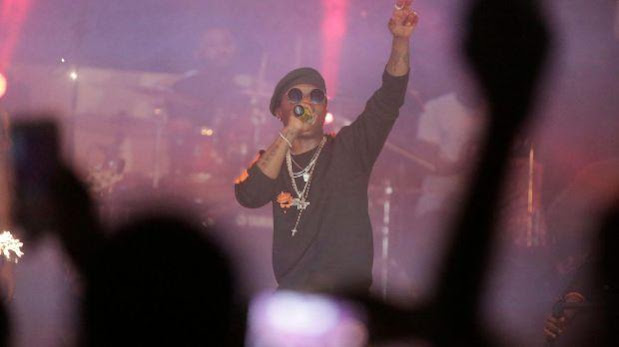HONOURS :
''' '' WORLD AFROBEATS WONDER '' '''
THE WORLD EMBRACES AFROBEATS : Hit after hit featuring African artists has been trending on charts right across the globe. The advent of social media and steaming services was a game changer for Nigerian artists.
Afrobeats music has taken the world by storm. Hit after hit featuring African artists has been trending on charts across the globe. But why now? ''Time is of the essence,'' Nigerian singer Tems croons on Afrobeat star Wizkid's 2021 summer hit, Essence.
Viewed over 67 million times on YouTube, and million more times when counting remixes on TikTok and Instagram, Essence was a summer hit.
Not long ago, this kind of global success for an Afrobeats song would have raised eyebrows. But the truth is : The Afrobeats genre broadly - and specifically the Nigerian music industry - has in recent years produced hit after hit, reports DW.
Be they longing melodies such as Essence, Burna Boy'sheady beats, Yemi Alade's Afropolitan tones, Wizkid's party-starter Joro or Davido's jovial Fall, these tracks have woken a sleeping giant. A Nigerian treasure trove of musical talent and creativity is pumping across dance floors from Lagos to Los Angeles.
The Nigerian powerhouse
The rise to global prominence of Afrobeats seems to have coincided with the pandemic. Indeed, hit after hot and collaborations with big-name international acts, from Justin Bieber to Beyonce to Ed Sheeran, are among recent successes. But the reality is different, the Lagos based veteran producer and musician Ade Bantu told DW.
Nigeria has always been a powerhouse when it comes to music, ''Bantu said, rattling off a list of household names including King Sunny Ade and Fela Kuti.
To explain the current wave of international prominence that Nigerian artists are enjoying, Bantu pointed pointed to the 2012 success of the Nigerian D'Banj. His barrier-breaking, dancefloor-shaking single Oliver Twist in the United Kingdom ''opened the floodgates.''
''Everybody has caught the Nigerian bug. And then you have this massive Nigerian diaspora in the UK, the United States and other hubs around the world,'' Bantu said.
Analysts have sought to correlate the increased interest in Afrobeats with growing, upwardly mobile West African diaspora populations in major music markets.
But even the term Afrobeats is blurry. Afrobeats with an 's' differs from the horn-filled Afrobeat music associated with Fela Kuti. The term was only coined in the mid-2000s in London by DJs in the diaspora to market popular music coming out of Nigeria.
Before that, the creations of West African artists were often lumped together with other musicians under the term World Music, the arts and culture journalist Bolaji Alonge told DW.
''Afrobeats with an 'S' is a combination of different genres over the decades - from highlife to reggae. Today you have Afrofunk, Afrohouse, Afropolitan music, and all fall under the label Afrobeats,'' Alonge said.
Young, independent, hip
Still, would a Wizkid or a Davido have made the same splash 10 years ago? Bantu said no.
''You had predominantly white men dictating taste, especially in one of the biggest markets in the world, the United States. Now, all of sudden, it's the kids, it's the audience that determines what is hip and what isn't,'' said Bantu.
Gone are the days when individual record companies - both local and foreign - acted as gatekeepers to Afrobeats stardom. With local and foreign streaming services, including Spotify and Apple Music, recently expanding operations in Africa, artists and Djs can tap into other markets.
Alonge said the power of the Internet had been a catalyst : Instagram, TikTok and other platforms have provided more access to Afrobeats than ever before. Bantu said self-sufficient and tech-savvy youngsters could help quench the modern world's thirst for personalized, visual-oriented entertainment.
''These Nigerian kids, they have the skills to do everything themselves. They do their music videos, they know how to put it on radio, they put it on the Internet. I mean, these kids were shooting music videos that were on par with what they were watching on MTV!''
Bantu forsees a bright future. Urban African artists ''are way more skilled when it comes to adapting to challenges'' than their counterparts elsewhere, he said.
Streaming and social media opens markets
Dj EnoB works the decks in lagos for a living, and he plays Afrobeats ''90% of the time.'' The genre's rise has increased his workload, but added a whole lot competition.
''If you want to differentiate yourself, you have to go just beyond playing Afrobeat. So you may look for some related genres like Amapiano or change in your style of your mixing,'' he told DW, referring to South Africa's house-derived beats.
Dj EnoB believes that access to global markets through streaming services has made the Nigerian music business more competitive and in some ways fairer.
From Lagos to the continent A Pan-Africanist genre.
Nigeria's sizable local market has kept the music afloat long enough for the genre to explode internationally. Alonge rejected the idea that Nigeria is a gatekeeper for Afrobeats.
''Be you from Uganda, Be you from Kenya, be you from Ghana, if the song is beautiful, if the people like it, the song will go around the continent,'' Alonge said.
Bantu added the success of Nigerian artists have empowered other African musicians.
The Honour and Serving of the Latest Global Operational Research on Afrobeats, Music and the world, continues. The World Students Society thanks DW and The Express Tribune.
With most respectful dedication to all the nations of the African continent, and then Students, Professors and Teachers of the world.
See Ya all prepare and register for Great Global Elections on The World Students Society - for every subject in the world : wssciw.blogspot.com and Twitter - E-!WOW! - The Ecosystem 2011 :
Good Night and God Bless
SAM Daily Times - the Voice of the Voiceless

.png)


0 comments:
Post a Comment
Grace A Comment!